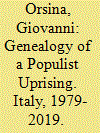| Srl | Item |
| 1 |
ID:
167235


|
|
|
|
|
| Summary/Abstract |
After the 2018 general election, Italy became the only Western European country governed exclusively by anti-establishment forces. The importance of this goes beyond domestic implications, not only because what happens to the south of the Alps is relevant to the future of the European Union, but also because, with Italy often having been a bellwether for global trends, more general lessons can be drawn from its history. The Italian populist uprising can best be understood by looking at how the malfunctioning of the Italian public sphere, the anti-political zeitgeist, and the country’s struggle to squeeze itself into the European monetary straitjacket have interacted with each other over the last forty years. Two junctures are critical: the political and institutional earthquake of 1992-94, and the sovereign debt crisis of 2011 and its aftermath.
|
|
|
|
|
|
|
|
|
|
|
|
|
|
|
|
| 2 |
ID:
172513


|
|
|
|
|
| Summary/Abstract |
This essay contextualises Hungarian antipolitics of Europe as an element of radical conservative nation-building and as a reflection of the strategic use of borders. Two concrete examples of border politics will be elaborated that document shifts from EU-conformity to EU-contestation and the increasing political significance of culturalist arguments. These cases, moreover, are exemplary of the dual nature of then nationalist-conservative agenda which involves: 1) the implementation of an ethnopolitical and thus extraterritorial, de-bordered notion of nation and 2) the unilateral securitisation of Hungary’s borders, for example with Serbia, in a self-proclaimed defence of European integrity. The research that informs this essay is based on a review of media sources, academic and policy-focused literature. The essay begins with a discussion of links between Hungarian euroscepticism and the radical conservative nation-building project and continues with an analysis of post-1989 border politics with regards to the areas mentioned above. Considerable attention will be devoted to the Hungarian government’s politics of borders and contestations of European Union within the context of the so-called refugee crisis and wider debates regarding immigration and asylum.
|
|
|
|
|
|
|
|
|
|
|
|
|
|
|
|
| 3 |
ID:
169125


|
|
|
|
|
| Summary/Abstract |
Urban development, and particularly the improvement of basic services delivery, is still approached in mostly technical terms by international development actors and municipalities of the Global South. Sanitation planning, for instance, remains the realm of engineers despite decades of evidence that conventional approaches focusing on infrastructure upgrading have failed to tackle socio-environmental challenges. Against this background, this paper explores sanitation planning in Mandalay, the second largest city of Myanmar. Here, the Asian Development Bank and a French consulting firm have seized the opportunity created by the country’s recent opening to embark with the municipality on a multi-million dollar scheme: the Mandalay Urban Services Improvement Project (MUSIP). Drawing upon insights from critical development studies, the paper argues that the MUSIP can be interpreted as an ‘anti-politics machine’ that ignored local needs and proposed disputable solutions to local sanitation challenges. The paper further explores how this machine jeopardised urban development in Mandalay more generally, and was eventually challenged by the municipality. The paper concludes that the case is not unique and illustrates how urban development is today being reshaped throughout Myanmar, while it also shows the continued relevance of the ‘anti-politics’ framework to understand contemporary urban development assistance projects.
|
|
|
|
|
|
|
|
|
|
|
|
|
|
|
|